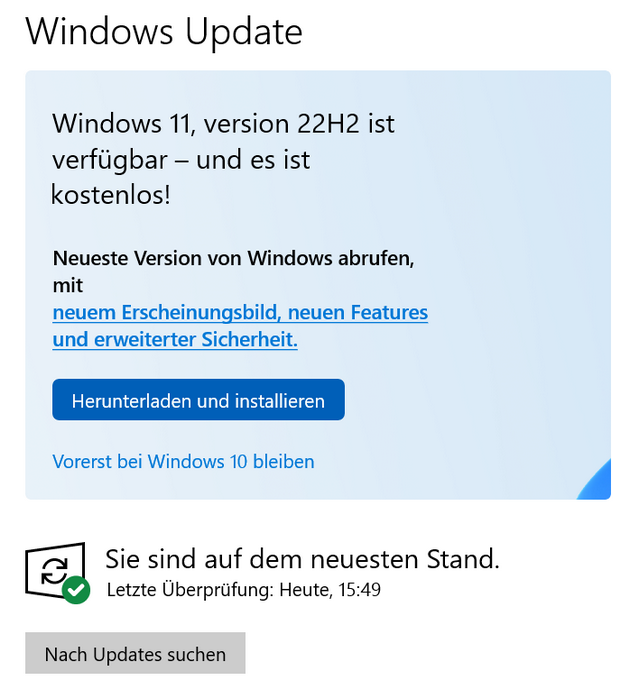 [German]Since Windows 10 22H2 will no longer be supported as of October 14, 2025, we can expect more Windows 11 upgrade campaigns from Microsoft. I would therefore like to ask the readership whether anyone else has noticed that these upgrade offers are also being made for non-compatible hardware, e.g. missing TPM?
[German]Since Windows 10 22H2 will no longer be supported as of October 14, 2025, we can expect more Windows 11 upgrade campaigns from Microsoft. I would therefore like to ask the readership whether anyone else has noticed that these upgrade offers are also being made for non-compatible hardware, e.g. missing TPM?
Personally, I get an an upgrade to Windows 11 every few months on a Dell notebook running Windows 10 22H2 (a second notebook runs Linux and is fortunately excluded from such offers, and the desktop doesn't get any upgrade offers either).

Beside from the fact that this notebook (Dell Latitude 7490) is delivered with Windows 10 (according to Dell, it should even be compatible with Windows 119, I have always refused the "happiness with Windows 11" for other reasons and there was no auto-upgrade.
Report about a forced upgrade in March 2025
Back in March 2025, a company administrator contacted me because his clients had been automatically switched to Windows 11 24H2 bypassing the WSUS. Clients with Windows 10 22H2 are used in the company.
The reader wrote that an upgrade had also come in with the patchday updates on March 11, 2025, which caused Windows 10 computers to install Windows 11 without confirmation.
According to the screenshot above, update KB5053598 was rolled out (is the cumulative update of March 11, 2025 for Windows 11 24H2, see Patchday: Windows 10/11 Updates (March 11, 2025)). The clients had been updated to the new Windows 11 version without the consent of the administrators. Since a WSUS is used in the reader's environment to manage client updates, this update should not have been rolled out to Windows 10 clients. I presented the case in the German blog post Windows 10 22H2: Zwangsupgrade auf Windows 11 24H2 (11. März 2025)?
A computer is converted despite deactivated TPM
Georg contacted me by email yesterday. He owns a 2020 Lenovo notebook (IdeaPad S145-15IWL [81MV014QGE]), which runs Windows 10 22H2 as the operating system. According to his statement, he has deactivated the TPM 2.0 option in the UEFI in order to be spared from forced upgrades. You often read this "upgrade protection" advice.
Now he was "offered" to upgrade to Windows 11 24H2 on the Lenovo IdeaPad S145-15IWL notebook despite the TPM 2.0 being disabled in the UEFI. In his e-mail, the reader expressed his surprise and anger at Microsoft's audacity, especially as he is planning to switch to other operating system versions (but not Windows 11) in the near future.
Perhaps there are different UEFI options that have led Georg to this upgrade offer. He was still able to decline the upgrade offer. In this context, Georg and I are interested to know whether other readers have also made such an observation?




